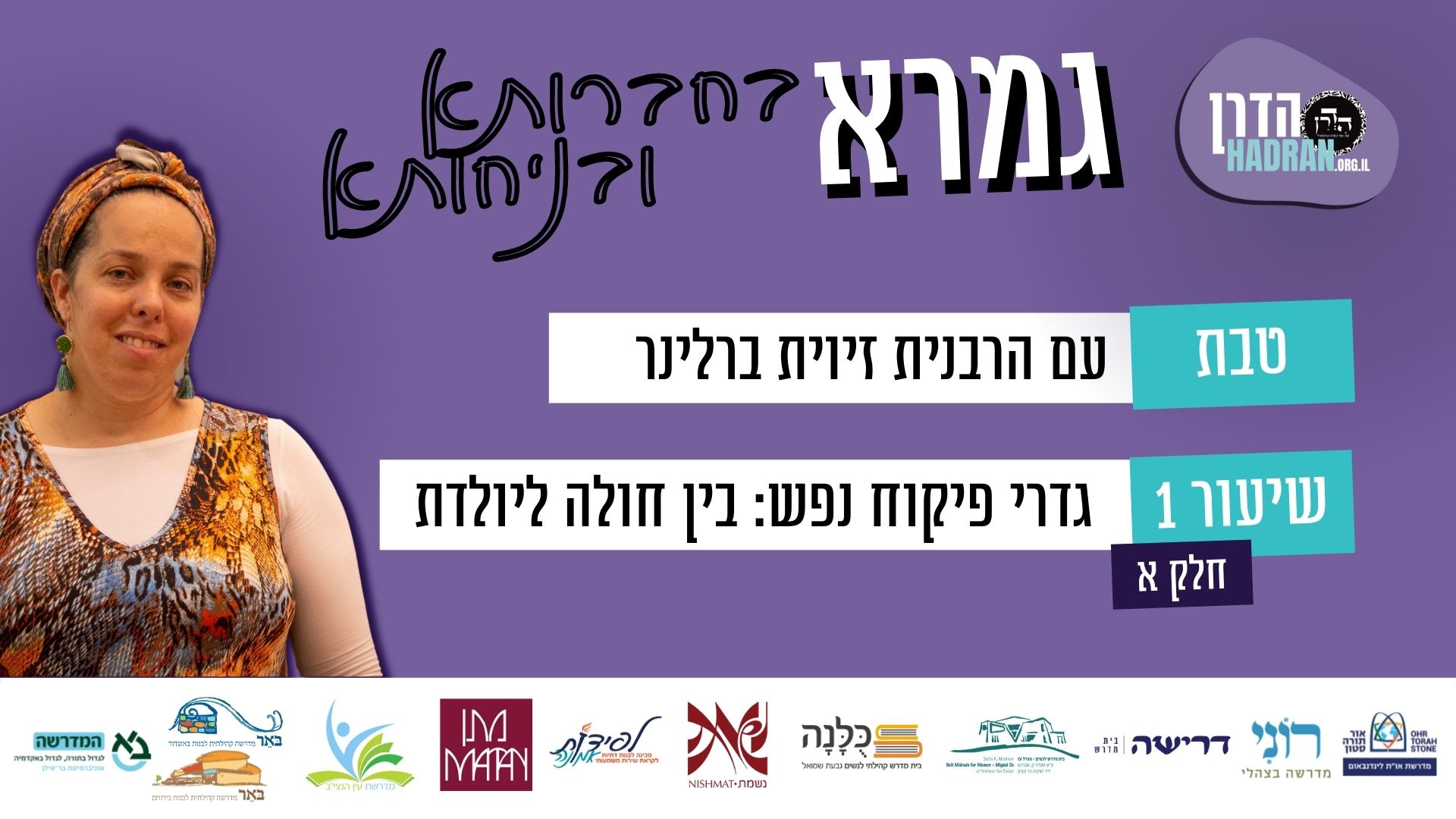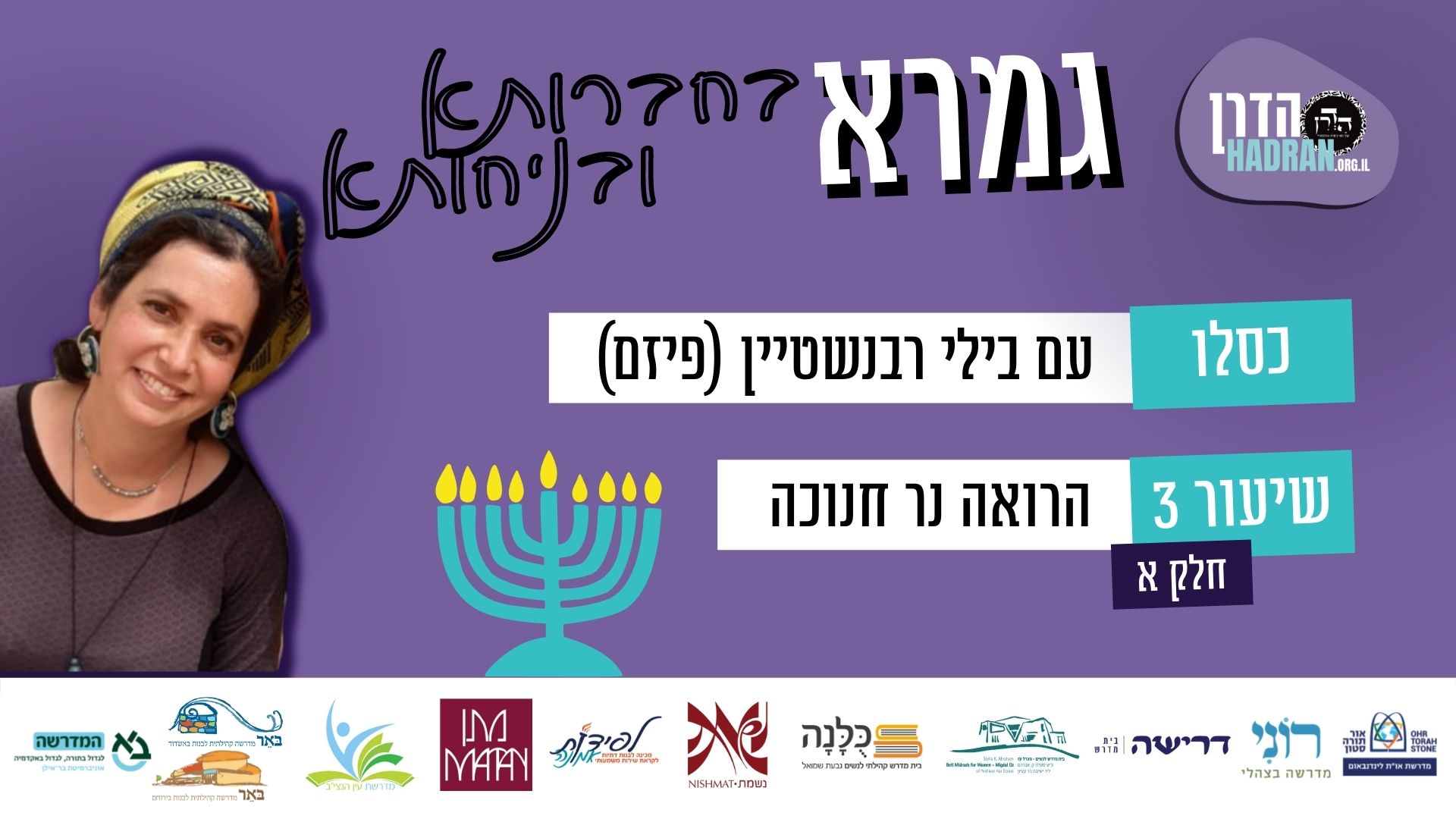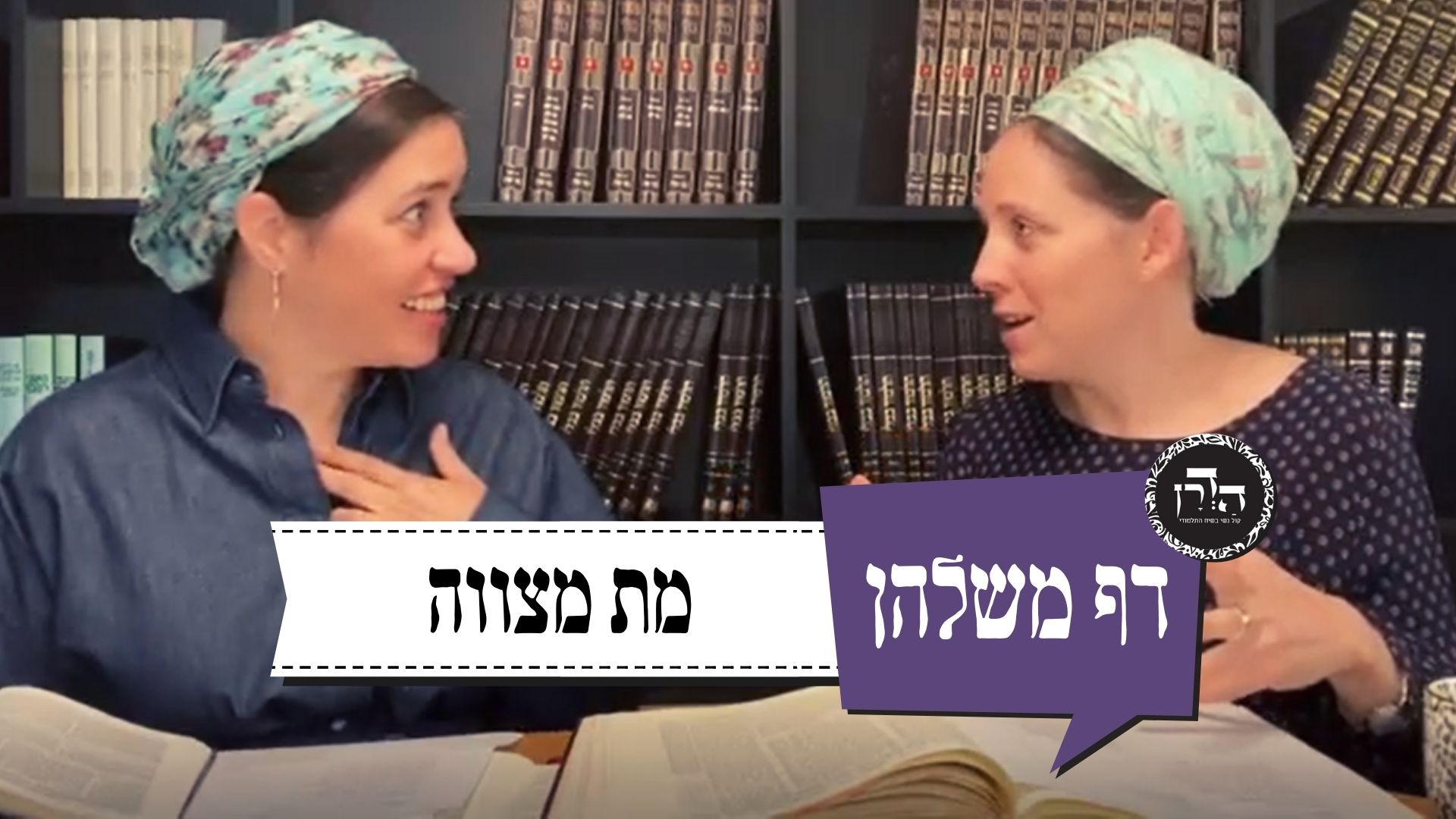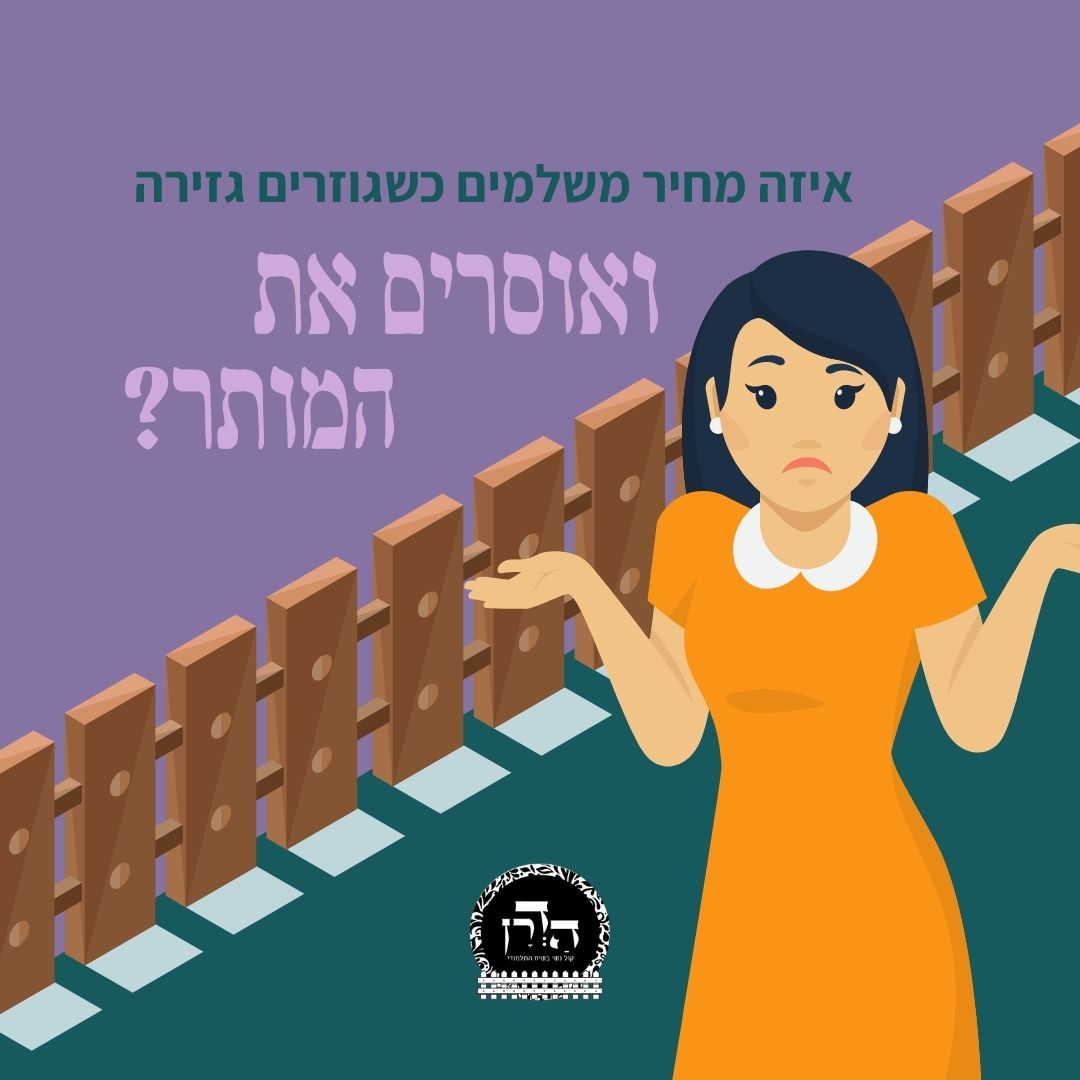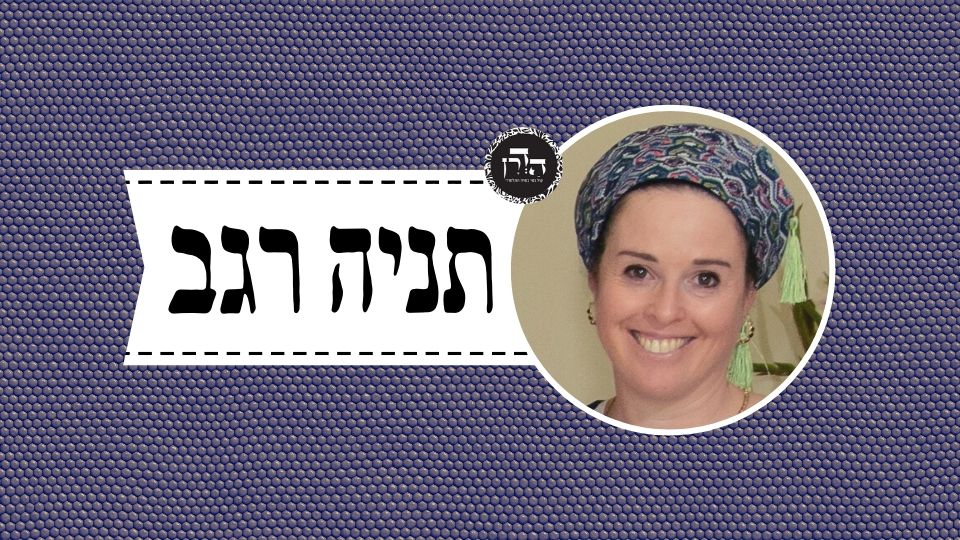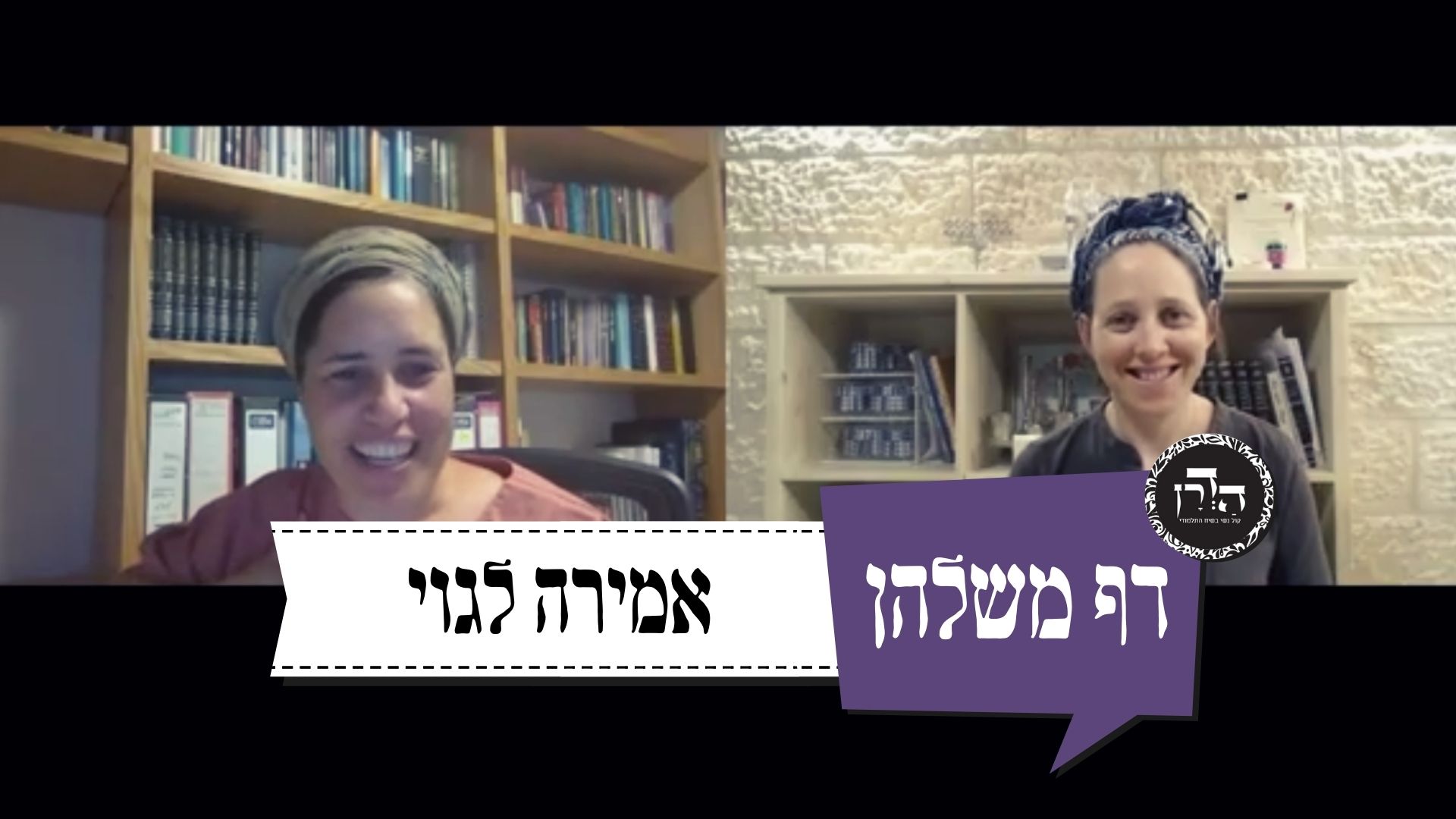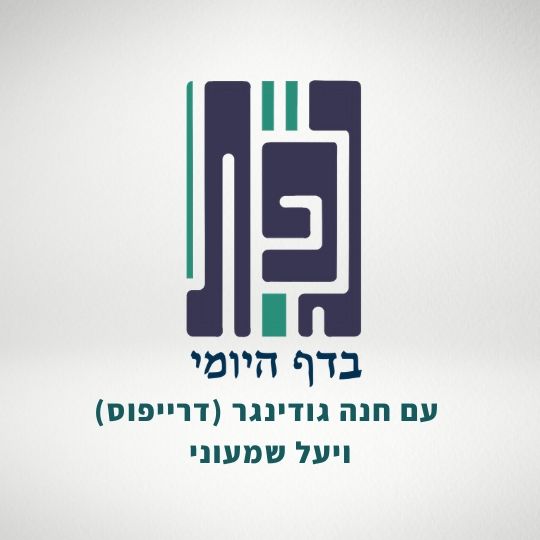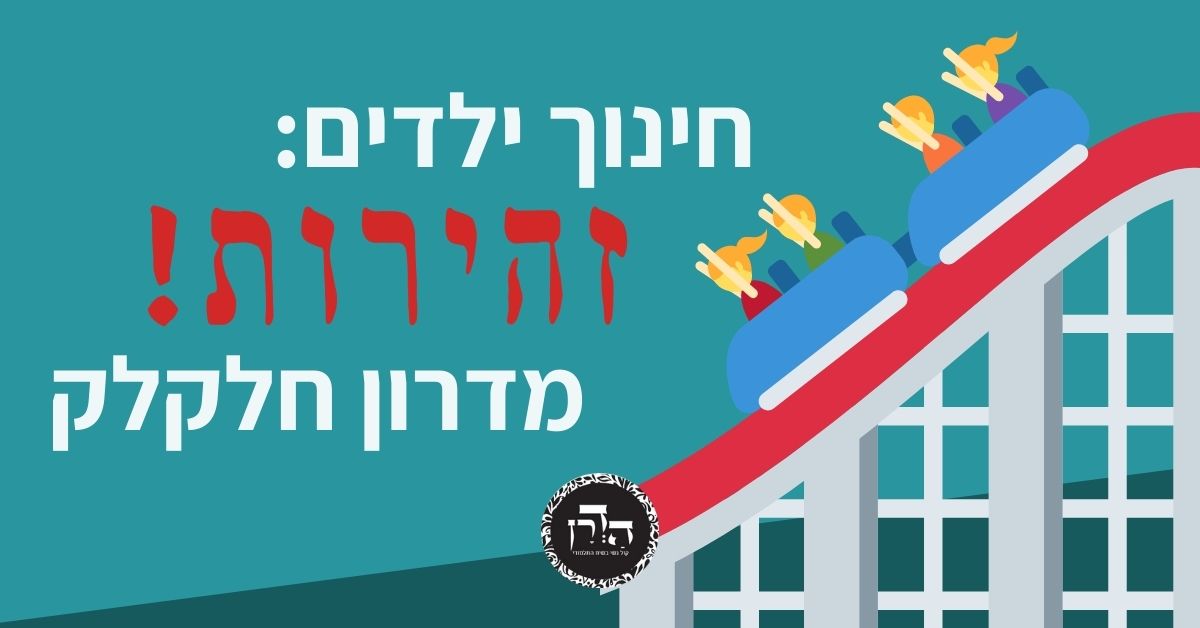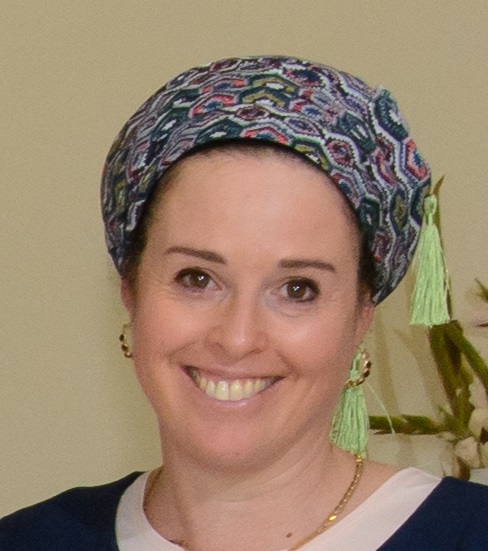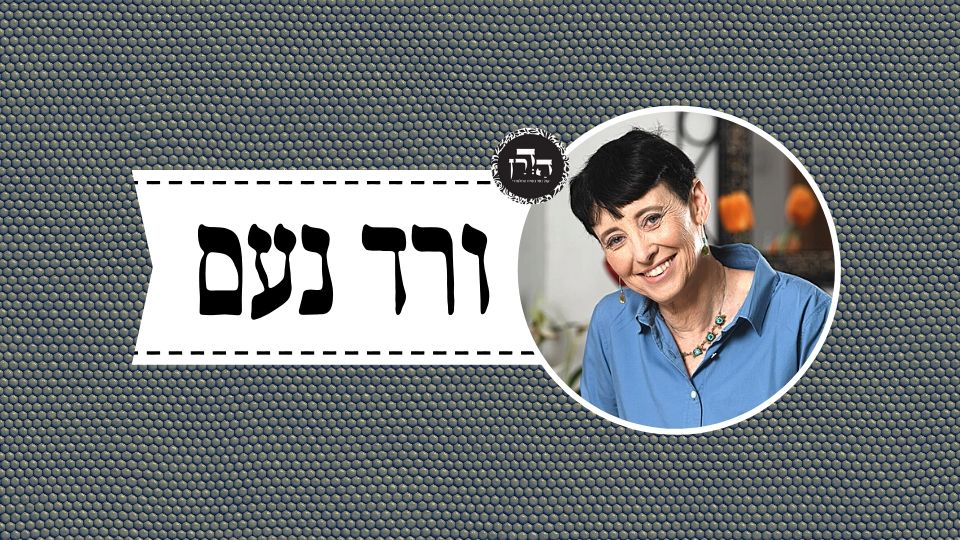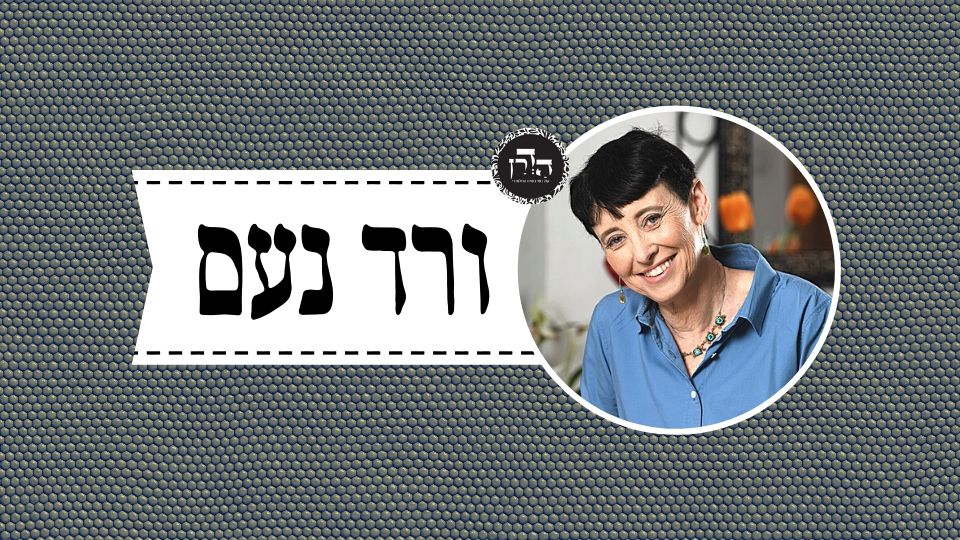שבת פו
כְּטַבְלָא מְרוּבַּעַת. כְּטַבְלָא הוּא דִּשְׁרֵי, הָא לָאו הָכִי — אָסוּר! הָתָם לְאַקּוֹלֵי בָּהּ קוּלָּא אַחֲרִינָא, לְהַתִּיר רֹאשׁ תּוֹר הַיּוֹצֵא הֵימֶנָּה.
as a square board. All of the halakhot of planting various species were stated with regard to a square-shaped garden bed. By inference: When it is like a square board, it is permitted; and when that is not the case, it is prohibited. Planting different species in horizontal and vertical rows without a space between the species is ineffective, even with circles. Rav Ashi replied: When the baraita says a square board, it does not mean that the only way to demarcate between different species is when the rows are in that configuration. Rather, it is to introduce a different leniency. The baraita came to permit a triangular plot that protrudes from it into another field. This means that a triangular protrusion into another field is considered a conspicuous demarcation only if the bed was square; in that case, no additional measures are necessary.
מַתְנִי׳ מִנַּיִן לְפוֹלֶטֶת שִׁכְבַת זֶרַע בַּיּוֹם הַשְּׁלִישִׁי שֶׁתְּהֵא טְמֵאָה? שֶׁנֶּאֱמַר: ״הֱיוּ נְכֹנִים לִשְׁלֹשֶׁת יָמִים״. מִנַּיִן שֶׁמַּרְחִיצִין אֶת הַמִּילָה בַּיּוֹם הַשְּׁלִישִׁי שֶׁחָל לִהְיוֹת בְּשַׁבָּת? שֶׁנֶּאֱמַר: ״וַיְהִי בַיּוֹם הַשְּׁלִישִׁי בִּהְיוֹתָם כֹּאֲבִים״. מִנַּיִן שֶׁקּוֹשְׁרִין לָשׁוֹן שֶׁל זְהוֹרִית בְּרֹאשׁ שָׂעִיר הַמִּשְׁתַּלֵּחַ? שֶׁנֶּאֱמַר: ״אִם יִהְיוּ חֲטָאֵיכֶם כַּשָּׁנִים כַּשֶּׁלֶג יַלְבִּינוּ״. מִנַּיִן לְסִיכָה שֶׁהִיא כִּשְׁתִיָּיה בְּיוֹם הַכִּפּוּרִים? אַף עַל פִּי שֶׁאֵין רְאָיָה לַדָּבָר זֵכֶר לַדָּבָר, שֶׁנֶּאֱמַר: ״וַתָּבֹא כַמַּיִם בְּקִרְבּוֹ וְכַשֶּׁמֶן בְּעַצְמוֹתָיו״.
MISHNA: The mishna continues to cite a series of unrelated halakhot based upon biblical allusions. From where is it derived that a woman who discharges semen even on the third day after relations is ritually impure, just like one who touches semen (see Leviticus 15:17)? Because the semen remains fit for insemination, it can transmit impurity, as it is stated prior to the revelation at Sinai: “And he said to the people, prepare yourselves for three days, do not approach a woman” (Exodus 19:15). This three-day separation period ensured that even a woman who discharged semen would be pure. The mishna cites another halakha based on a biblical allusion: From where is it derived that one may wash the circumcision on the third day, meaning the third day after the circumcision, even if it occurs on Shabbat? As it is stated: “And it came to pass on the third day when they were in pain” (Genesis 34:25). The pain of circumcision lasts at least three days, and as long as the child is in pain he is considered to be in danger. The mishna cites another halakha with an allusion in the Bible: From where is it derived that one ties a scarlet strip of wool to the head of the scapegoat that is dispatched to Azazel? As it is stated: “If your sins be like scarlet, they will become white like snow” (Isaiah 1:18). Since the goat is offered to atone for sins, red wool is tied to its horns. The mishna cites another allusion. From where is it derived that smearing oil on one’s body is like drinking and is similarly prohibited on Yom Kippur? Although there is no proof for this, there is an allusion to it, as it is stated: “And it comes into his inward parts like water and like oil into his bones” (Psalms 109:18). The verse appears to equate smearing oil on one’s body with drinking water.
גְּמָ׳ רֵישָׁא דְּלָא כְּרַבִּי אֶלְעָזָר בֶּן עֲזַרְיָה, סֵיפָא כְּרַבִּי אֶלְעָזָר בֶּן עֲזַרְיָה? דְּאִי כְּרַבִּי אֶלְעָזָר בֶּן עֲזַרְיָה — טְהוֹרָה שְׁמַעְנָא לֵיהּ. מַאן דְּלָא מוֹקֵי כְּתַנָּאֵי, תָּנֵא רֵישָׁא ״טְהוֹרָה״, וּמוֹקֵי לַהּ לְכוּלַּהּ כְּרַבִּי אֶלְעָזָר בֶּן עֲזַרְיָה, וּמַאן דְּמוֹקֵים כְּתַנָּאֵי, רֵישָׁא רַבָּנַן וְסֵיפָא כְּרַבִּי אֶלְעָזָר בֶּן עֲזַרְיָה.
GEMARA: The Gemara comments on the halakhot cited in the mishna: The first clause in the mishna with regard to discharged semen is not in accordance with the opinion of Rabbi Elazar ben Azarya. The latter clause in the mishna with regard to circumcision is in accordance with the opinion of Rabbi Elazar ben Azarya. As, if one was to assert that the first clause is also in accordance with the opinion of Rabbi Elazar ben Azarya, we heard him say that in that case the woman is ritually pure. The Gemara explains: He who does not establish the mishna as reflecting the opinions of two tanna’im, has a variant reading of the mishna; he teaches the halakha in the first clause: The woman is ritually pure, and establishes the entire mishna in accordance with the opinion of Rabbi Elazar ben Azarya. And he who establishes the mishna as reflecting the opinions of two tanna’im, holds that the first clause is in accordance with the opinion of the Rabbis, and the latter clause is in accordance with the opinion of Rabbi Elazar ben Azarya.
תָּנוּ רַבָּנַן: פּוֹלֶטֶת שִׁכְבַת זֶרַע בְּיוֹם הַשְּׁלִישִׁי טְהוֹרָה, דִּבְרֵי רַבִּי אֶלְעָזָר בֶּן עֲזַרְיָה. רַבִּי יִשְׁמָעֵאל אוֹמֵר: פְּעָמִים שֶׁהֵן אַרְבַּע עוֹנוֹת, פְּעָמִים שֶׁהֵן חָמֵשׁ עוֹנוֹת, פְּעָמִים שֶׁהֵן שֵׁשׁ עוֹנוֹת. רַבִּי עֲקִיבָא אוֹמֵר: לְעוֹלָם חָמֵשׁ, וְאִם יָצָאתָה מִקְצָת עוֹנָה רִאשׁוֹנָה, נוֹתְנִין לָהּ מִקְצָת עוֹנָה שִׁשִּׁית.
The Gemara elaborates on the matter of a woman who discharges semen, citing that which the Sages taught in a baraita: A woman who discharges semen at any point on the third day is ritually pure; this is the statement of Rabbi Elazar ben Azarya. Rabbi Yishmael says: Even on the third day she is ritually impure. In addition, the only relevant tally is the number of days. The number of twelve-hour periods of night and day that passed is not relevant. Sometimes there are four twelve-hour periods that elapsed between cohabitation and discharge. If she had relations just before nightfall on Wednesday and discharged on Friday night at the beginning of Shabbat, it is considered as if three days passed, meaning Wednesday, Thursday and Friday; and four twelve-hour periods, meaning Wednesday night, Thursday day, Thursday night and Friday day. Sometimes there are five twelve-hour periods that elapsed, in a case where she discharged semen at the end of Friday night. Sometimes there are six twelve-hour periods that elapsed, if she had relations at the beginning of Tuesday night and discharged at the end of the third day. Rabbi Akiva says: The halakha is that it is always five twelve-hour periods. And if she had relations after part of the first period passed, she is given part of the sixth period to complete the requisite five twelve-hour periods, so that sixty hours will have elapsed between cohabitation and discharge.
אַמְרוּהָ רַבָּנַן קַמֵּיהּ דְּרַב פָּפָּא, וְאָמְרִי לַהּ רַב פָּפָּא לְרָבָא: בִּשְׁלָמָא רַבִּי אֶלְעָזָר בֶּן עֲזַרְיָה כְּרַבָּנַן — דְּאָמְרִי בְּחַמְשָׁא עֲבוּד פְּרִישָׁה, וְרַבִּי יִשְׁמָעֵאל כְּרַבִּי יוֹסֵי — דְּאָמַר בְּאַרְבְּעָה עֲבוּד פְּרִישָׁה, אֶלָּא רַבִּי עֲקִיבָא כְּמַאן? לְעוֹלָם כְּרַבִּי יוֹסֵי, כִּדְאָמַר רַב אַדָּא בַּר אַהֲבָה: מֹשֶׁה בְּהַשְׁכָּמָה עָלָה וּבְהַשְׁכָּמָה יָרַד.
The Rabbis said this before Rav Pappa, and some say that Rav Pappa said this to Rava: Granted, Rabbi Elazar ben Azarya holds in accordance with the opinion of the Rabbis, who say with regard to the revelation at Sinai that Moses instituted separation between husbands and wives on the fifth day of the week. Since everyone agrees that the Torah was given on Shabbat, husbands and wives were separated for two days. And Rabbi Yishmael holds in accordance with the opinion of Rabbi Yosei, who said that Moses instituted separation on the fourth day of the week, meaning that husbands and wives were separated for three days. However, in accordance with whose opinion did Rabbi Akiva state his opinion? Ritual impurity, in this case, is not based on the passage of days but on the passage of twelve-hour periods, which do not correspond to either opinion mentioned with regard to the revelation at Sinai. The Gemara answers: Actually, Rabbi Akiva holds in accordance with the opinion of Rabbi Yosei. However, his understanding is based on that which Rav Adda bar Ahava said: Moses ascended Mount Sinai early in the morning, and he descended early in the morning and related to them the mitzva of separation.
בְּהַשְׁכָּמָה עָלָה, דִּכְתִיב: ״וַיַּשְׁכֵּם מֹשֶׁה בַבֹּקֶר וַיַּעַל אֶל הַר סִינַי״. בְּהַשְׁכָּמָה יָרַד, דִּכְתִיב: ״לֶךְ רֵד וְעָלִיתָ אַתָּה וְאַהֲרֹן עִמָּךְ״, מַקִּישׁ יְרִידָה לַעֲלִיָּיה: מָה עֲלִיָּיה בְּהַשְׁכָּמָה, אַף יְרִידָה בְּהַשְׁכָּמָה.
The Gemara explains the source of this opinion: He ascended Mount Sinai early in the morning, as it is written: “And Moses rose up early in the morning, and went up to Mount Sinai, as the Lord had commanded him” (Exodus 34:4). And he descended the mountain early in the morning, as it is written: “Go descend and you shall ascend together with Aaron” (Exodus 19:24). The Torah juxtaposes descent to ascent to establish that just as Moses’ ascent was early in the morning, so too, his descent was early in the morning. Moses told the people to separate in the early morning so that there would be five complete periods of separation over the course of the three days.
לְמָה לֵיהּ לְמֵימְרָא לְהוּ, וְהָא אָמַר רַב הוּנָא: יִשְׂרָאֵל קְדוֹשִׁים הֵן וְאֵין מְשַׁמְּשִׁין מִטּוֹתֵיהֶן בַּיּוֹם! הָא אָמַר רָבָא: אִם הָיָה בַּיִת אָפֵל — מוּתָּר. וְאָמַר רָבָא וְאִיתֵּימָא רַב פָּפָּא: תַּלְמִיד חָכָם מַאֲפִיל בְּטַלִּיתוֹ, וּמוּתָּר.
The Gemara asks: Why did he need to tell them to separate during the morning hours? Didn’t Rav Huna say: The Jewish people are holy and do not have relations during the day? It was not necessary to command them until night. The Gemara replies: It was necessary to tell them in the morning, as Rava said: If it was a dark house, it is permitted to have relations during the day. And similarly, Rava said, and some say that Rav Pappa said: A Torah scholar obscures the light in the room with his cloak and is thereby permitted to have relations during the day. Therefore, it was necessary to command the people to separate even during the daytime hours.
וְהָא טְבוּלֵי יוֹם נִינְהוּ? אַבָּיֵי בַּר רָבִין וְרַב חֲנִינָא בַּר אָבִין דְאָמְרִי תַּרְוַויְיהוּ: נִיתְּנָה תּוֹרָה לִטְבוּל יוֹם. יָתֵיב מָרִימָר וְקָאָמַר לַהּ לְהָא שְׁמַעְתָּא. אֲמַר לֵיהּ רָבִינָא לְמָרִימָר: נִיתְּנָה קָאָמְרַתְּ, אוֹ רְאוּיָה קָאָמְרַתְּ? אֲמַר לֵיהּ: רְאוּיָה קָאָמֵינָא.
The Gemara asks: Didn’t some of the people have status of those who immersed themselves during the day when they received the Torah? Some of the women immersed themselves on Shabbat evening to purify themselves from the discharge of semen. Even after immersion, the purification process is not complete until sunset. It was Abaye bar Ravin and Rav Ḥanina bar Avin who both said in response: The Torah was given to those who immersed themselves during the day, and that in no way diminishes the magnitude of the revelation. The Gemara relates that Mareimar sat and stated this halakha. Ravina said to Mareimar: Did you say that the Torah was actually given to those who immersed themselves during the day, or did you say that it was fit to be given to those who immersed themselves during the day, but, in reality, it was not? He said to him: I said that the Torah was fit to be given, but in actuality the nation was ritually pure, and the women did not discharge semen on the third day.
וְלִיטְבְּלוּ בֵּינֵי שִׁימְשֵׁי, וְלִיקַבְּלוּ תּוֹרָה בֵּינֵי שִׁימְשֵׁי? אָמַר רַבִּי יִצְחָק: ״לֹא מֵרֹאשׁ בַּסֵּתֶר דִּבַּרְתִּי״. וְלִיטְבְּלוּ בְּצַפְרָא דְשַׁבְּתָא, וְלִיקַבְּלוּ תּוֹרָה בְּצַפְרָא דְשַׁבְּתָא? אָמַר רַבִּי יִצְחָק: שֶׁלֹּא יְהֵא הַלָּלוּ הוֹלְכִין לְקַבֵּל תּוֹרָה וְהַלָּלוּ הוֹלְכִין לִטְבִילָה.
The Gemara asks: And let them immerse during twilight on Shabbat eve and receive the Torah just after that during twilight. Why was it necessary to delay revelation until Shabbat morning? Rabbi Yitzḥak said that the verse said in that regard: “From the first, I did not speak in concealment” (Isaiah 48:16). God did not give the Torah under the cloak of night, but rather in the light of day. The Gemara asks: And let them immerse themselves on Shabbat morning and receive the Torah on Shabbat morning. In that case, according to all opinions, the period of separation could have begun one twelve-hour period later. Rabbi Yitzḥak said: This was not done so that there would not be a situation where these, one segment of the people, would be going to receive the Torah while those, another segment of the people, would be going to immerse themselves. Optimally, the entire nation should go to receive the Torah together.
אָמַר רַבִּי חִיָּיא בְּרַבִּי אַבָּא אָמַר רַבִּי יוֹחָנָן: זוֹ דִּבְרֵי רַבִּי יִשְׁמָעֵאל וְרַבִּי עֲקִיבָא, אֲבָל חֲכָמִים אוֹמְרִים: שֵׁשׁ עוֹנוֹת שְׁלֵמוֹת בָּעֵינַן. אָמַר רַב חִסְדָּא: מַחֲלוֹקֶת שֶׁפֵּירְשָׁה מִן הָאִשָּׁה, אֲבָל פֵּירְשָׁה מִן הָאִישׁ — טְמֵאָה כׇּל זְמַן שֶׁהִיא לַחָה. מֵתִיב רַב שֵׁשֶׁת: ״וְכׇל בֶּגֶד וְכׇל עוֹר אֲשֶׁר יִהְיֶה עָלָיו שִׁכְבַת זָרַע״ — פְּרָט לְשִׁכְבַת זֶרַע שֶׁהִיא סְרוּחָה. מַאי לָאו שֶׁפֵּירְשָׁה מִן הָאִישׁ? לָא, שֶׁפֵּירְשָׁה מִן הָאִשָּׁה.
Rabbi Ḥiyya, son of Rabbi Abba, said that Rabbi Yoḥanan said: These are the statements of Rabbi Yishmael and Rabbi Akiva. However, the Rabbis say: We require that six complete twelve-hour periods elapse between cohabitation and discharge. If a woman discharged semen less than seventy-two hours after having relations, the semen renders her ritually impure. Rav Ḥisda said: The dispute over how long semen renders one ritually impure is only with regard to semen that is discharged from a woman; however, if it is discharged from a man, e.g., it was on a garment, it is impure as long as it is moist, regardless of how much time passed since its discharge. Rav Sheshet raises an objection based on what was taught in a baraita: The Torah states: “And every garment, and every hide on which there is semen shall be immersed in water, and be impure until evening” (Leviticus 15:17). And the Sages taught: This excludes semen which is foul. What, is it not referring to semen discharged from a man, indicating that even moist semen becomes foul after a certain period of time and no longer transmits impurity? The Gemara rejects this: No, this halakha is referring to semen that was discharged from a woman.
בָּעֵי רַב פָּפָּא: שִׁכְבַת זֶרַע שֶׁל יִשְׂרָאֵל בִּמְעֵי גוֹיָה מַהוּ? יִשְׂרָאֵל דִּדְאִיגִי בְּמִצְוֹת — חֲבִיל גּוּפַיְיהוּ, גּוֹיִם דְּלָא דְּאִיגִי בְּמִצְוֹת — לָא. אוֹ דִילְמָא: כֵּיוָן דְּאָכְלִין שְׁקָצִים וּרְמָשִׂים חֲבִיל גּוּפַיְיהוּ. וְאִם תִּמְצֵי לוֹמַר כֵּיוָן דְּאָכְלִי שְׁקָצִים וּרְמָשִׂים חֲבִיל גּוּפַיְיהוּ: בִּמְעֵי בְּהֵמָה מַהוּ? אִשָּׁה הִיא דְּאִית לַהּ פְּרוֹזְדוֹר — מַסְרְחָא, אֲבָל בְּהֵמָה דְּלֵית לַהּ פְּרוֹזְדוֹר — לָא, אוֹ דִילְמָא לָא שְׁנָא. תֵּיקוּ.
Rav Pappa raised a dilemma: What is the halakha with regard to semen of a Jew in the womb of a gentile woman? Do we say that since Jews are concerned about fulfilling mitzvot, due to that concern, their body temperature is hot and semen that is not absorbed becomes foul faster, in contrast to gentiles who are not concerned about fulfilling mitzvot for whom that is not the case? Or, perhaps, since gentiles eat detestable creatures and creeping animals their body temperature is also hot? And if you say that since they eat detestable creatures and creeping animals, their body temperature is hot, another dilemma can be raised: What is the halakha with regard to semen of a Jew in the womb of an animal? Do we say that in a woman, who has a long corridor [perozdor] to her womb, the semen becomes foul; but in an animal, which does not have as long a corridor, it does not? Or perhaps it is not different, and the period of time that the semen renders one ritually impure is the same in both cases? No resolution was found for these dilemmas. Therefore, let them stand unresolved.
תָּנוּ רַבָּנַן: בְּשִׁשִּׁי בַּחֹדֶשׁ נִיתְּנוּ עֲשֶׂרֶת הַדִּבְּרוֹת לְיִשְׂרָאֵל. רַבִּי יוֹסֵי אוֹמֵר: בְּשִׁבְעָה בּוֹ. אָמַר רָבָא: דְּכוּלֵּי עָלְמָא בְּרֹאשׁ חֹדֶשׁ אֲתוֹ לְמִדְבָּר סִינַי. כְּתִיב הָכָא: ״בַּיּוֹם הַזֶּה בָּאוּ מִדְבַּר סִינָי״, וּכְתִיב הָתָם: ״הַחֹדֶשׁ הַזֶּה לָכֶם רֹאשׁ חֳדָשִׁים״ — מָה לְהַלָּן רֹאשׁ חֹדֶשׁ, אַף כָּאן רֹאשׁ חֹדֶשׁ. וּדְכוּלֵּי עָלְמָא, בְּשַׁבָּת נִיתְּנָה תּוֹרָה לְיִשְׂרָאֵל. כְּתִיב הָכָא: ״זָכוֹר אֶת יוֹם הַשַּׁבָּת לְקַדְּשׁוֹ״, וּכְתִיב הָתָם: ״וַיֹּאמֶר מֹשֶׁה אֶל הָעָם זָכוֹר אֶת הַיּוֹם הַזֶּה״ — מָה לְהַלָּן בְּעִצּוּמוֹ שֶׁל יוֹם, אַף כָּאן בְּעִצּוּמוֹ שֶׁל יוֹם. כִּי פְּלִיגִי בִּקְבִיעָא דְיַרְחָא: רַבִּי יוֹסֵי סָבַר — בְּחַד בְּשַׁבָּא אִיקְּבַע יַרְחָא, וּבְחַד בְּשַׁבָּא לָא אֲמַר לְהוּ וְלָא מִידֵּי מִשּׁוּם חוּלְשָׁא דְּאוֹרְחָא; בִּתְרֵי בְּשַׁבָּא אֲמַר לְהוּ: ״וְאַתֶּם תִּהְיוּ לִי מַמְלֶכֶת כֹּהֲנִים״;
The Sages taught: On the sixth day of the month of Sivan, the Ten Commandments were given to the Jewish people. Rabbi Yosei says: On the seventh day of the month. Rava said: Everyone agrees that the Jews came to the Sinai desert on the New Moon, as it is written here: “In the third month after the children of Israel were gone forth out of the land of Egypt, the same day came they into the wilderness of Sinai” (Exodus 19:1), without elaborating what day it was. And it is written there: “This month shall be to you the beginning of months; it shall be the first month of the year to you” (Exodus 12:2). Just as there, the term “this” is referring to the New Moon, so too, here the term is referring to the New Moon. And similarly, everyone agrees that the Torah was given to the Jewish people on Shabbat, as it is written here in the Ten Commandments: “Remember the Shabbat day to keep it holy” (Exodus 20:8), and it is written there: “And Moses said to the people: Remember this day, in which you came out from Egypt, out of the house of bondage, for by strength of hand the Lord brought you out from this place; there shall be no leaven eaten” (Exodus 13:3). Just as there, the mitzva of remembrance was commanded on the very day of the Exodus, so too, here the mitzva of remembrance was commanded on the very day of Shabbat. Where Rabbi Yosei and the Sages disagree is with regard to the determination of the month, meaning which day of the week was established as the New Moon. Rabbi Yosei held: The New Moon was established on the first day of the week, and on the first day of the week He did not say anything to them due to the weariness caused by the journey. On the second day of the week, He said to them: “And you shall be to Me a kingdom of priests and a holy nation; these are the words that you shall speak to the children of Israel” (Exodus 19:6).



